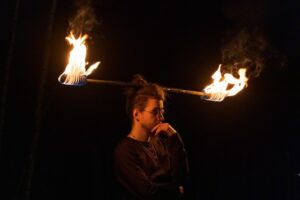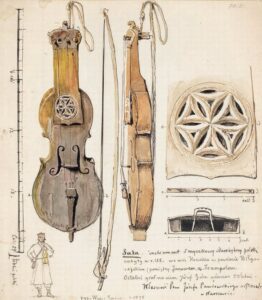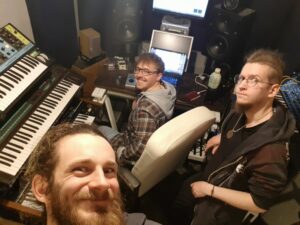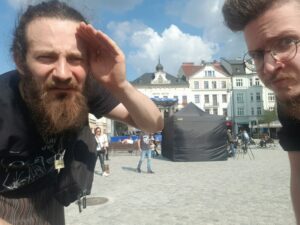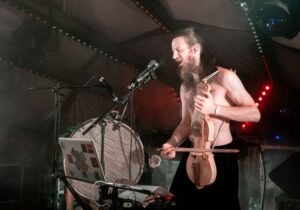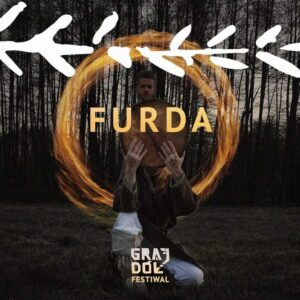I have known Bolesław Ren Rygiel (FB) for a long time now. All the way back to 2012/2013 when I was involved with the World of OMNIA fan group. I first noticed Ren when he uploaded a cover version of an OMNIA song he played on flute. A very good version actually and from that moment on I always encouraged this young Polish musician to do something with his talent. That went on for about ten years and then, in 2022, a package fell through my letterbox from a new Polish neo folk duo called Furda (FB), and one of the members was Ren. That album, Bojany, has become a firm favourite in the de Booy household. I actually consider it to be one of the best debut albums I’ve heard since I’ve started listening to neo folk music, so it is high time I catch up with Ren and ask all about the CD Bojany and his band Furda.
So how did you and your fellow band member Jakub Podskarbi meet up?
– ‘We met at one of the Polish folk festivals but we are not sure anymore which one it was. Jakub (FB) was playing a gig at one of these festivals with his other band Sumana (FB).
Afterwards we just jammed around a fire and we met like that. From then on me and Jakub started to talk about maybe doing some project together.’
And that was the start of Furda?
– ‘Well that is sort of a funny story actually. As I said we were sort of talking talking about working together and at one point in 2021 Jakub just messaged me like: ‘Yo, we are playing a concert in two weeks or something.’ Ren continued laughingly: -‘ So he invited me to his house to talk things through and we decided we needed to make some material. We also decided we wanted to use live looping techniques so that we could use a lot of our instruments, just the two of us.’
I did notice you and Jakub use an impressive range of historic– and neo folk instruments. All sorts of recorders, a xaphoon, a Bulgarian kaval, a kalimba, a darbuka, and the kantele to name just a few.
– ‘Yes that is true. Besides being really active in the local neo folk scene. Jukab is also an instrument maker who specializes in creating some extinct or rare instruments such as the Polish traditional fiddle, the suka biłgorajska.
It is an instrument that had been extinct for over 150 years and now is the core of our sound essentially. The cool part of it is he made that suka biłgorajska himself .
Quite a lot of the instruments we use are either made or modified by us. At the moment I personally don’t really use many instruments I made myself but that is what I ‘m aiming for in the future. ‘
So you wanted to try and use all those instruments at that very first concert?
– ‘Yeah we thought it would be a fun idea to make something that was musically complex, using a lot of different instruments, but only with us two playing, so live looping was the way to go. We sat down at Jakubs house and jammed with a lot of different instruments and a looping effect.
We came up with a couple of song sketches that day that we then polished in if I am not mistaken one more rehearsal.’ Ren says with a smile. –’And yeah, then we played our first gig. Which was quite unsuccessful to be honest because we weren’t fully prepared for what we were hoping to achieve technically. So it was a rather stress full experience. After that we kept making music together. figuring out how to make the live looping concept we wanted work. How to be more consistent technically and how to make it a fun experience for everyone involved.’
That explains the way the songs on Bojany are build up. Did any of those first songs make it to your debut album?
– ‘Yes, most of the song sketches on Bojany come from that first rehearsal and that first gig we played. In the autumn of 2020 we decided we wanted to record an album. So Jakub came to stay at my home. I live in our family house, a nice wooden house my grandma build for us all in the forest. So we set up a studio in my bedroom and we just settled down for over two weeks and recorded every single day. We would wake up, eat breakfast and start recording We did for two weeks in a row. Every single day! Recording, recording, more recording, mixing, composing and recording again. I have to say, it were a rough couple of weeks.
Why? Well when you try to speedrun the recording of an album like that, day after day, and do it in one recording session it is very exhausting. It ended up being a very tiring experience. But a fun one none the less because it is a creative process and creative processes are fun. But , laughing, there were some obstacles on the road. For instance, as I said the studio was set up in my bedroom. Well my dad is a carpenter and his workshop is right next to my bedroom and there is essentially no walls and no doors between my bedroom and his workshop. So you can imagine there would be quite a few electric carpentry devices like saw blades and stuff , that made a lot of noises that we didn’t want on our recordings. So we had to organize a schedule that would work for both my dad and us as well. So yeah, it was difficult to pull it all off but luckily we did.’
You recorded and mixed the album together, did you also do the mastering yourself?
– ‘No, when we had the album somewhat ready we went to a friend of mine, Maurycy Żółtański (FB)(middle), who I used to go to school with. He now is a professional producer. He did the mastering for us and he gave the album a more Polish and a more sparky sound.’
The first video single you uploaded is of the title song Bojany. In the description under it you explain it is a local Polish folk tale collected in an unpublished book by Oskar Kolberg, a Polish ethnographer, folklorist, and composer. Are all the songs on the album based on Polish folkore?
At this point Ren starts to laugh out loud : – ‘I’m sorry Cliff, but actually Bojany is not based on polish folklore at all. The story that you refer to, was actually made up by Jakub, he improvised that post on the go. I think he just felt it was a fun way to introduce our music. Using a mystical story. So I’m afraid it is actually made up, although Oskar Kolberg was indeed a very renowned ethnologist and researcher of the polish folk culture and its mythology, so the story was certainly inspired by him.
So although most of the songs on Bojany are not directly based on Polish folklore, there is one exception: the song Lisek. That song is based around a well known Polish nursery rhyme. Other then that the songs on Bojany aren’t inspired by Polish folk tales as such, but it was recorded in the village of Bojany, the village where I live, and I have to say that Bojany in itself is a very interesting place. It is a very mystical area, with a lot of local folk tales. Lots of ghost stories actually and other things that are on the verge of the metaphysical. It is a place that is quite rich in those, shall I say weird forest myths and ghost stories. It would be safe to say this area definitely had some impact on us and the music we were making as we were recording it.’
When I was trying to translate the lyrics, the program I used found some Bengali in there. Did you really use Bengali lyrics on Bojany?
– ‘No there is no Bengali on the album, all the lyrics are either in Polish or -mostly- a made up language that me or Jakub created. That idea is something that goes back a long time, even before we started Furda. Whenever I would make a song I would quite often improvise some intuitive, made-up language, supposed to just match the song; the vibe or the feelings of that song.
It is not something that is really think through in that sense I don’t t usually write the made-up language lyrics out beforehand. Usually they come to me on the go and then transcribe them afterwards.
An interesting thing I noticed is that whenever I transcribe made up languages there seem to some similarities between them. Like some words that will come up often among these intuitive lyrics. Sometimes I try to piece it all together and create like a full on language created by me. I am not the only on in Furda doing that. Jakub created some intuitive phrases created as well, one example is the song Skeya Rokha.’
So Ney Haro and Skeya Rokha have ‘intuitive’ lyrics?
– ‘Yes Bojany, Ney Haro, Skeya Rokha, Ski’la va, Furdana they all have made-up lyrics although on Furdana there is not a lot of lyrics there beside ‘furdandandandandanda’ -laughs- which is just a twist on the bands name. Jakubs inspiration behind these ‘lyrics’ were the buddhist meditation chants, were they monks often use throat singing too. Those chants become very trans like because of the repeated phrases for a long period of time and we tried to recreate that in our own way.
We do have some polish lyrics as well. There is Lisek, which is based on this Polish nursery rhyme and then there is Zwiędły, which is written by me a couple of years back. These are the only two songs in polish on Bojany, but there is more to come on the next album.’
Oh cool! A new album! how far away is that?
– ‘The next album is quite far away actually. Jakub was very eager to play as many concerts as possible and if you play a lot of gigs you don’t have a lot of time to record new music, but we are planning to start recording some new songs. But we are not going to do it in one session again. We will do it one song at a time this time. Currently we have around four new songsketches for new album tracks that we perform live. With two of them we are almost done recording them.
I can already tell you these new songs will be a bit different. They are more acoustic driven. We want to go for a more live feel this time. The songs on our debut album Bojany are mostly quite slow paced and very atmospheric. When we play them live they become much more dynamic, more dancy. With the next album we want to go for this more dynamic more energetic approach as well. So the new album is gonna be a bit more wild then the first one. Do we already have a release date? No not yet. We hope to have the album out before next season if all goes well.’
Furda has its very own quite unique sound. Which bands would you say inspired you both?
– ‘ Our musical inspirations? For me that would obviously be OMNIA and quite certainly Heilung as well. We were both actually quite heavily inspired by Heilung at the beginning stages of Furda. Jakub’s main inspiration was an electronic music project called Lorn.
That’s where he took the idea for the deep bass sound that is present in a couple of our songs from. So in other words Furda is a mixture of a bit of ruff ambient sounds mixed with nice folky melodies and some electronic bass and percussion.
Something I didn’t mention before and maybe is not that obvious is that those very deep bass sounds like in the end of Skeya Rokha are actually not electronic sample or synthesizer sounds, It is actually the sound of the suka biłgorajska, put through a bunch of different guitar effects.
The fun part is we do try to use these ‘electronic’ sounds, especially in our live gigs, but we do it by manipulating the sounds of the different acoustic instruments we use with effects. That’s a big part of our sound it live gigs I would say, improvising and playing around with sounds.
With Furda what we just try to make music that stands out. It is somewhat rooted in folklore but what we go for is creating music that is open for interpretation. We don’t want to make music focused on a specific style or genre or cultural region or anything. So our music is a pretty crazy amalgamation of different ideas, cultural references and musical inspirations.
But we do try to make it feel a bit, ahm, ‘antique’. We do this with our choice of instruments and with the way we approach our music. It is pretty raw and played on a concert very improvised. When we play live we do have the general framework of how a song is supposed to go. However we do go for improvisation quite a lot. In my opinion this is the fun part of being a musician. That you get to create things and improvisation is just pure creation. We love doing it because it is just a lot of fun and makes every concert unique.’
Are the songs on Bojany also improvised then?
– ‘Well as I said most of the songsketches come from that first improvised jam session and are based on these improvised loops and song ideas we had. There is certainly some degree of improvising during recording. We normally don’t, you know, write our music, like – laughs – we don’t plan it out a lot. Usually we get a quick idea and we hop into recording and see what comes out. So our workflow is– laughing- very much impulse driven. We just have a crazy idea, we hop into the studio, work on it and see what happens.’
It sounds like fun is a big part of the band. I even saw you say you play ‘scarecrow’ with Furda according to your Facebook page?
– ‘Yes I do have ‘scarecrow with Furda’ written on my Facebook page and yes this band is certainly about having quite a lot of fun. We try to not take ourselves, and our music to serious. Everything with a little humor.
Obviously the scarecrow is a reverence to the Bojany video where we put on these crazy scarecrow costumes that Jakub made.’ He laughs: These costumes weren’t very comfortable to walk in actually. It was barely possible to move around in them but we were able to pull of the music video and survive for the day so all was good in the end.’
You already told us about that ‘first’ gig that didn’t go so well. What was your coolest gig then?
– ‘Then our first real gig as Furda comes to mind. It was in 2022 at Grajdół Festiwal, a very interesting Polish folk festival in the mountains.Very unusual actually as it is located on top of a mountain! It is pretty much impossible to get there as it is such a remote location. The only way really is by foot, climbing up this mountain. The organization have some very strong jeep-like trucks to stuf to the top of that mountain and they used those powerful Jeep trucks to get all our instruments and ger up there. Its a very nice festival organized by a very nice group of young competent people.
The atmosphere there was just amazing. It was one off the most magical festival experiences I had, maybe ever even, just because of how remote and wild this location is. So it was a great experience, although, the fun part is that we were scheduled to play around 24:00 at night, but as with almost every festival there were some delays in the program.
Now although I still uphold that the organization is very nice and capable, the delay was so severe we ended up playing four or five hours later! So we didn’t play at midnight but started when the sun was starting to come up. We had a hard time keeping our energy levels up till we could play the gig. Also the sound guy had a bit to much to drink and got lost in the woods so it was -laughs out loud- -an adventure. A very difficult but also really fun gig.
We played there again this year, on top of a different mountain, and this time it all went really smoothly. Definitely a magical festival to play at Grajdół Festiwal. If the CeltCast readers ever get the change they should go there.’
Furda can be found here:
- Facebook: @FurdaBand
- Instagram: @furda_band
- Youtube: https://www.youtube.com/FurdaBand
- Spotify: Furda
